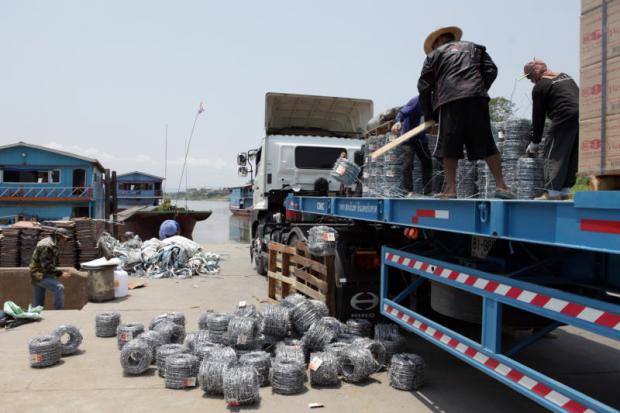The northern part of Chiang Rai province, which borders Laos and Myanmar, is one of 10 new Special Economic Zones announced by the government.

Lead-in: Workers were unloading construction materials to the ferry in Chiang Khong district in Chiang Rai. (Photo by Jetjaras na Ranong)
The others lie in Tak and Kanchanaburi provinces, which border Myanmar; Mukdahan, Nong Khai and Nakhon Phanom on the Laos border; Trat and Sa Kaeo on the Cambodia border; and Songkhla and Narathiwat in the South, bordering Malaysia.
The Board of Investment wants to use the SEZs to promote business activities with neighbouring countries, capitalising on Asean Economic Community liberalisation and new logistics and transport facilities along the border.
Border trade currently accounts for 10% of Thailand's total exports and was projected to grow by 20-25% in 2015, according to the Board of Investment.
The special investment incentives are designed to attract more investment to the areas and, the BoI claims, promote effective economic wealth distribution. The BoI believes they will provide an enhanced atmosphere for investors looking for opportunities in the region.
Thailand has identified 13 industries that stand to benefit from the SEZs: agriculture and fisheries; ceramics; garments, textiles and leather; furniture; gems and jewellery; medical equipment; cars and parts; electronics; plastics; pharmaceuticals; logistics; industrial estates; and tourism.
Companies operating any of those 13 target business activities will be offered maximum incentives through the BoI, including an eight-year corporate tax exemption, import duty exemption on machinery and raw materials, and an additional 50% reduction on corporate income tax for five years.
Other incentives include double deductions from the costs of transportation, electricity and water supply for 10 years; an additional 25% cost deduction for installation or construction of facilities; and other non-tax incentives.
New one-stop service centres will also be set up to allow for faster licensing and permission issuance procedures, and the government has announced it will improve basic infrastructure and customs checkpoints and related services.
Other than those 13 target industries, eligible investments under the BoI promotion list will also be offered additional incentives, depending on the type of industry, with a maximum three-year corporate income tax exemption.